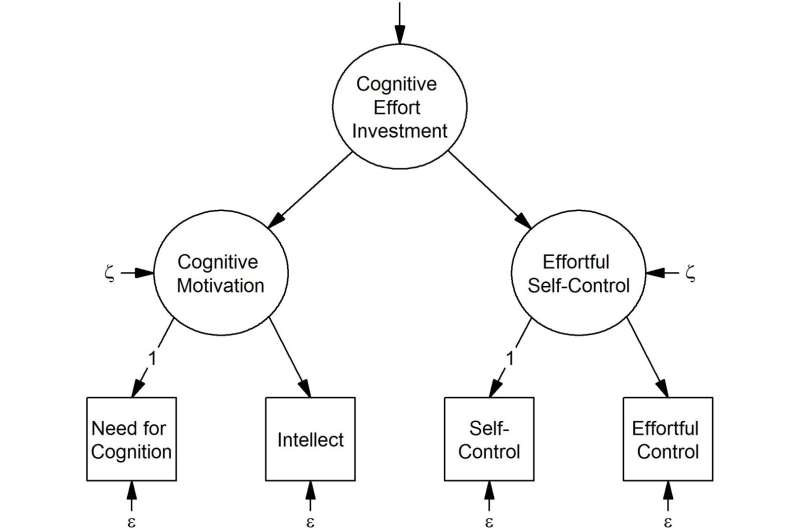This article has been reviewed according to Science X's editorial process and policies. Editors have highlighted the following attributes while ensuring the content's credibility:
fact-checked
peer-reviewed publication
trusted source
proofread
Cognitive effort investment: Does disposition become action?

In a recent study conducted by the Collaborative Research Centre 940 Volition and Cognitive Control of Dresden University of Technology, psychologists systematically related the trait cognitive effort investment to actual effort investment.
The team was able to show that individuals with high motivation for effortful cognition actually exert effort more efficiently and regardless of reward. The study thus contributes to a better understanding of person-situation interactions, i.e. how situations and personality influence effort investment in goal-directed behavior.
In psychology, cognitive effort investment is a human trait that describes the tendency to engage in demanding situations. It is considered a sub-component of motivation. Cognitive effort investment is a significant factor in learning and professional success. But why do some people accept greater effort than others and how can the step from effort investment to effort realization succeed?
A team from the Collaborative Research Centre 940 Volition and Cognitive Control has now addressed this question. The aim was to understand how situations and personality influence cognitive effort investment in goal-directed behavior.
An illustrative example can be generated from the school context: Some students only invest as many resources as necessary in learning to prepare for an exam. Others, however, learn for the joy of the content and with the aim of learning, understanding and solving new problems.
"Our results now provide evidence that people with high levels of cognitive effort investment exert effort more efficiently, even if learning is associated with difficulties, compared to students with low levels of this trait. In this context, the prospect of a grade or another reward, such as an ice cream after the learning day, has no influence on learning behavior. Students with lower levels of cognitive effort investment, on the other hand, would rather increase their learning effort through rewards," explains head of the study Corinna Kührt.
A total of 148 people took part in the study. During the completion of two cognitive control tasks, the participants' cognitive effort investment was systematically related to actual effort realization. To measure several dimensions of actual effort, the study team used a variety of methods, including questionnaires, performance measures, electroencephalography and eye-tracking. The results indicate that individuals with high cognitive effort investment exert their effort more efficiently and independently of reward.
The results offer an explanation for individual differences in the willingness to exert effort. Furthermore, they show that rewards are not generally supportive, but rather dependent on individual factors, i.e. personality. Rewarding the effort rather than the result not only increases motivation, but also performance.
The paper is published in the journal PLOS ONE.
More information: Corinna Kührt et al, Cognitive effort investment: Does disposition become action?, PLOS ONE (2023). DOI: 10.1371/journal.pone.0289428
Journal information: PLoS ONE
Provided by Dresden University of Technology




















